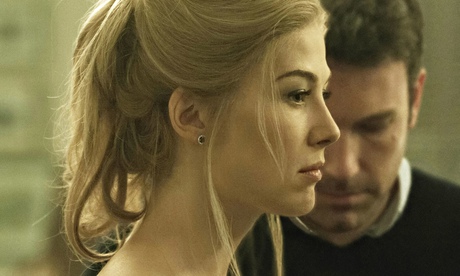
Like most people, I expect you go to the movies to be entertained. You might choose an action movie, with lots of special effects, or a dark thriller which keeps you on the edge of your seat. Right now you might choose Gone Girl, this autumn’s much-hyped mystery about the frantic search for a woman called Amy Dunne. Rosamund Pike plays the “girl” of the title – actually a thirtysomething wife – who has disappeared from her middle-class home in Missouri amid signs of a struggle.
Pike is English, and I can’t help wondering whether she or her co-star, Ben Affleck, is aware of a ground-breaking piece of research published last year by Britain’s then director of public prosecutions, Keir Starmer. I’m actually tempted to send a copy to both of them, and everyone else involved in this travesty of a movie. Affleck in particular, with his left-of-centre politics, should know better; he directed and starred in Argo, a movie so keen to be fair-minded that it began with a potted history of Iranian-American relations.
For Affleck, some relation to reality is clearly important. So why doesn’t that apply to domestic and sexual violence? Admittedly Affleck’s character in Gone Girl – he plays the husband, Nick Dunne – is particularly bone-headed, but the actor isn’t, so why didn’t he demand a disclaimer? Affleck wouldn’t dream of suggesting that the US had clean hands in events such as its historic support for the Shah of Iran, but recycling the most egregious myths about gender-based violence is, apparently, another matter.
I don’t want to spoil the plot for anyone who hasn’t seen the film, but one of its key themes is the notion that it’s childishly easy to get away with making false allegations of rape and domestic violence. The characters live in a parallel universe where the immediate reaction to a woman who says she’s been assaulted is one of chivalrous concern. Tell that to all the victims, here and in the US, who have had their claims dismissed by sceptical police officers.
There is a point towards the end of Gone Girl where one of the characters lies through her teeth at a press conference, only to have a law enforcement official intervene to protect her from questioning. This was the moment when my irritation towards a bad film, full of plot holes and cardboard characters, tipped over into something like disgust. I’m wondering why men who have seen the film aren’t up in arms – please tell me they are – about the portrayal of their sex as a bunch of credulous idiots.
I know Gone Girl is fiction. Gillian Flynn’s novel is quite cleverly done – the film is crude by comparison – but they both depend on a single plot twist. If you spot it in advance, the tension evaporates. I wouldn’t want to spend five minutes with Nick, Amy, his sister or her parents, while their relationship – shown in flashback after Amy’s disappearance – offers no clue as to why this unappealing couple ever got together. It fails completely as a portrait of a marriage, but that’s as nothing compared to the brazen misogyny of that plot twist.
When I started writing crime fiction, I was conscious that the genre was full of stereotypes. I thought many of the female characters were decades out of date, so I gave my protagonist a proper job – she’s an academic – and strong political views. Other writers were doing something similar, creating female characters who weren’t always admirable but behaved like real women. Gone Girl does the opposite, playing on what we now know about the behaviour of abused women and undermining the credibility of victims.
So let’s go back to that report I mentioned earlier, and what it had to say about false allegations of rape and domestic violence. Starmer described them as “very rare” and went on to say something that might have been written with Gone Girl in mind. “In recent years we have worked hard to dispel the damaging myths and stereotypes that are associated with these cases,” he observed with a hint of weariness. Everyone who works in this area knows what he means, and foremost among those myths is the idea that victims can’t be trusted. It’s a favourite theme of the Daily Mail, which is always ready to clear its front page to highlight cases of men who have been acquitted of rape, without pointing out that false allegations are rare.
The figures are stark. Starmer asked the Crown Prosecution Service to look at a 17-month period, during which there were 5,651 rape prosecutions and a staggering 111,891 for domestic violence. In the same period, only 35 women were prosecuted for making false allegations of rape and six for false claims of domestic violence. The standout finding was that occasions when a suspect deliberately makes a false allegation of rape or domestic violence “purely out of malice” are “extremely rare”.
That’s the premise of Gone Girl blown out of the water. Are you listening, Ben Affleck? Context matters in the movie business, whether the subject is geopolitics or the grim reality of gender-based violence.

